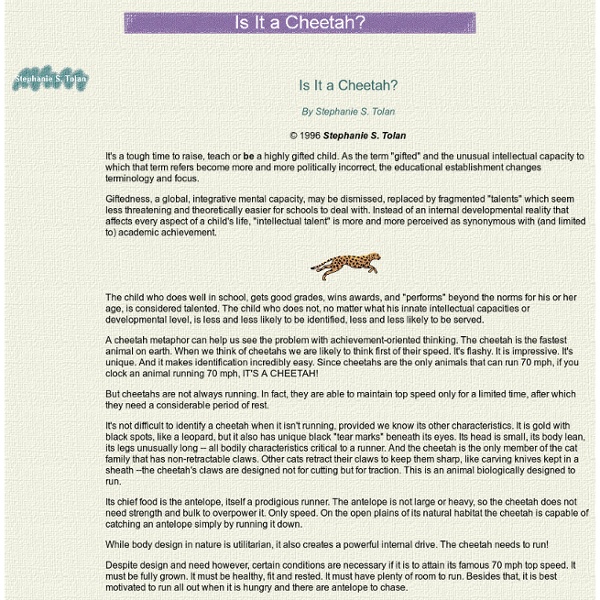Is It a Cheetah?

High Achiever, Gifted Learner, CreativeThinker
Identification of gifted students is clouded when concerned adults misinterpret high achievement as giftedness. High-achieving students are noticed for their on-time, neat, well-developed, and correct learning products. Adults comment on these students' consistent high grades and note how well they acclimate to class procedures and discussions. Some adults assume these students are gifted because their school-appropriate behaviors and products surface above the typical responses of grade-level students. Educators with expertise in gifted education are frustrated trying to help other educators and parents understand that while high achievers are valuable participants whose high-level modeling is welcomed in classes, they learn differently from gifted learners. In situations in which they are respected and encouraged, gifted students' thinking is more complex with abstract inferences and more diverse perceptions than is typical of high achievers. Szabos, J. (1989).
What Are the Characteristics of Effective Teachers of the Gifted?
Knowing the characteristics of the best teachers of gifted students would be helpful for a variety of reasons. Understanding these characteristics could help in the training of teachers, in hiring of teachers of the gifted, and in helping parents assess who might best serve their children. Although it would be helpful to understand the characteristics of the best teachers of gifted students, there does not appear to be a general consensus of what those characteristics are. There have, however, been a number of studies that attempt to synthesize this information. Based on questionnaire data and needing more thorough research, effective teachers of the gifted have the following characteristics: Student responses suggest effective teachers of the gifted need to be patient, have a sense of humor, move quickly through material, treat each student as an individual, avoid being a "sage on the stage" all the time, and consistently give "accurate" feedback.
Related:
Related:



